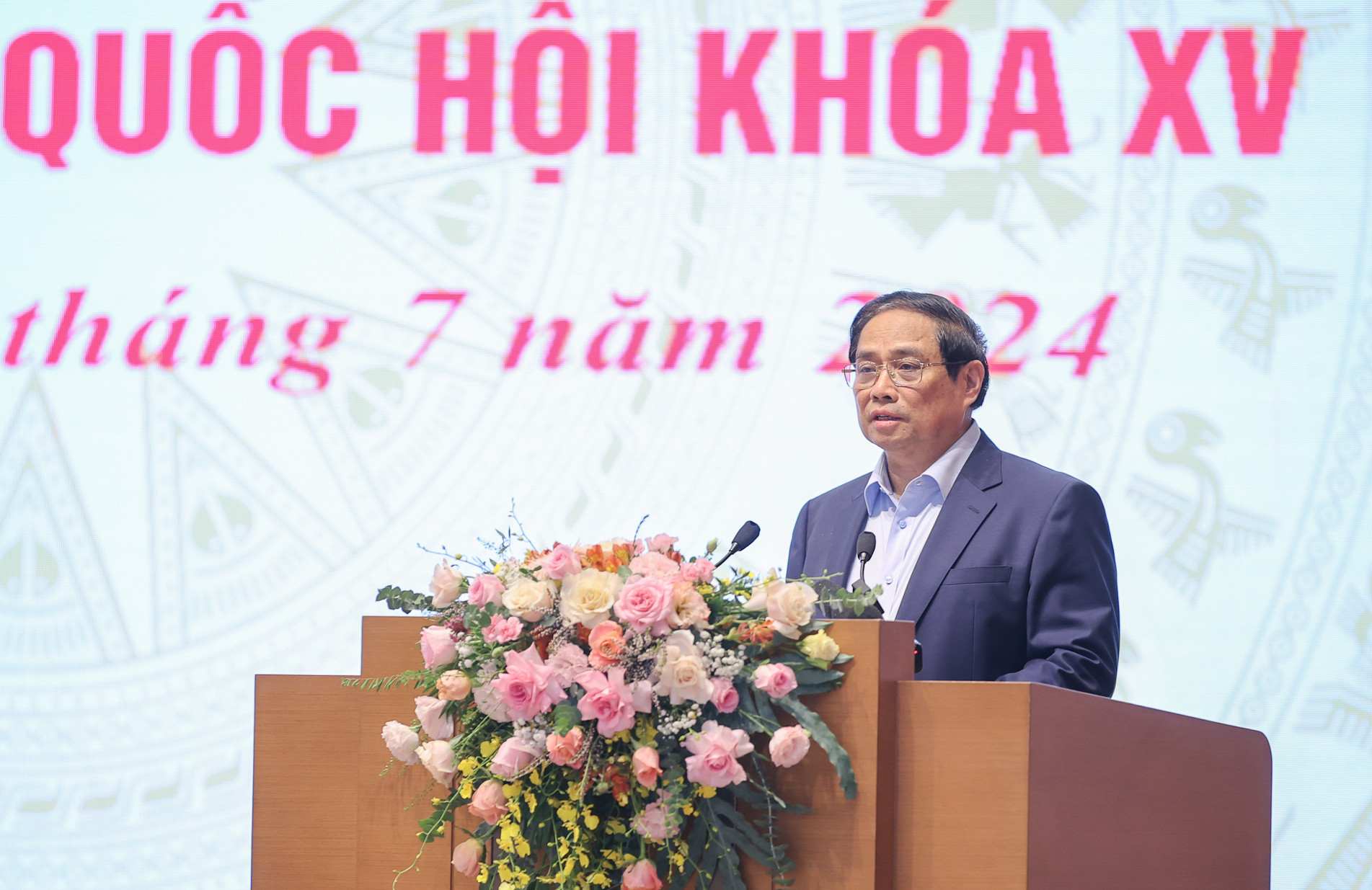
The National Assembly and the Government must proactively implement comprehensive solutions, with practical innovations in law-making, to immediately address difficulties, obstacles, and bottlenecks hindering development, particularly in land, infrastructure, and investment.
On the morning of July 30 in Hanoi, the Government, in coordination with the National Assembly Standing Committee and related agencies, organized a conference to disseminate and implement several laws and resolutions of the 15th National Assembly.
The conference, chaired by Prime Minister Pham Minh Chinh, was held at the Government Headquarters and connected online to 63 provincial and city locations.
In his opening remarks, Prime Minister Pham Minh Chinh emphasized that building and perfecting institutions is one of the three strategic breakthroughs and a significant policy of the Party and State.
The Government identifies this as a key task, focusing on synchronously implementing it from law-making to law enforcement. Investing in institutional development is investing in growth; perfecting institutions to clear obstacles, drive breakthroughs, and mobilize resources for development, especially in infrastructure.
Since the beginning of the term, the Government has organized 28 special sessions on law-making, reviewed and approved over 100 legislative proposals and draft laws, and issued more than 380 decrees.
Additionally, the Prime Minister has issued 90 normative decisions, and ministries have issued related guiding circulars.
During the sessions, the 15th National Assembly passed a significant number of laws and resolutions (over 60 documents), including important laws and resolutions such as the Land Law, Real Estate Business Law, Housing Law, Credit Institutions Law, Road Law, and resolutions on piloting specific mechanisms and policies for the development of provinces and cities.
At the 7th session alone, the National Assembly passed 11 laws, 2 normative resolutions, one resolution on the law-making program for 2025, adjustments to the 2024 law-making program, and 9 resolutions on socio-economic management.
The National Assembly and the Government have demonstrated high determination, great effort, and decisive, effective actions. They have proactively implemented comprehensive solutions with practical improvements and innovations in law-making, focusing on promptly addressing difficulties, obstacles, and bottlenecks hindering development, especially in land, infrastructure, investment, and business.
According to the Prime Minister, while drafting and issuing laws and resolutions is challenging, implementing these documents effectively in practice is even more difficult.
In recent times, the enforcement of laws has not been truly effective or efficient; it has not fully unlocked resources for rapid and sustainable development in the context of the Fourth Industrial Revolution. Many issues still need to be adjusted, amended, and supplemented, particularly those related to new growth drivers such as digital transformation, the green economy, and the circular economy.
Therefore, the organization of today's conference is essential to focus on thoroughly understanding the new points, key contents, requirements, and main tasks to bring newly issued laws and resolutions into practice.
The conference will also review some achieved results, and challenges during the implementation of several laws passed by the 15th National Assembly.
Listening to the opinions of ministries, sectors, and localities on the advantages, difficulties, and obstacles in practice and during the implementation of legal regulations, the Prime Minister emphasized the importance of drawing lessons to improve the quality of legal document drafting.
The conference also emphasizes the Political Bureau's Regulation No. 178 dated June 27, 2024, on controlling power, preventing corruption, and negative phenomena in law-making.
The Prime Minister requested the delegates to focus their intellect, continue the spirit of innovation, present reports, discussions, and speeches focusing on the requirement of "closely linking law-making with law enforcement, ensuring that laws are implemented fairly, strictly, consistently, promptly, effectively, and efficiently."
The Prime Minister stressed that delegates should discuss important issues and propose feasible, practical solutions to further enhance coordination, create synchronization, and unity among agencies to improve the quality of implementation, ensuring that laws and resolutions of the National Assembly are put into practice.
This will contribute to promoting socio-economic development, strengthening power control, and preventing corruption and negative phenomena in law-making.
The Prime Minister also emphasized proposing solutions to remove difficulties and obstacles, addressing existing problems and limitations in the implementation of laws and resolutions, issuing detailed regulations, and reviewing legal documents.
Thu Hang